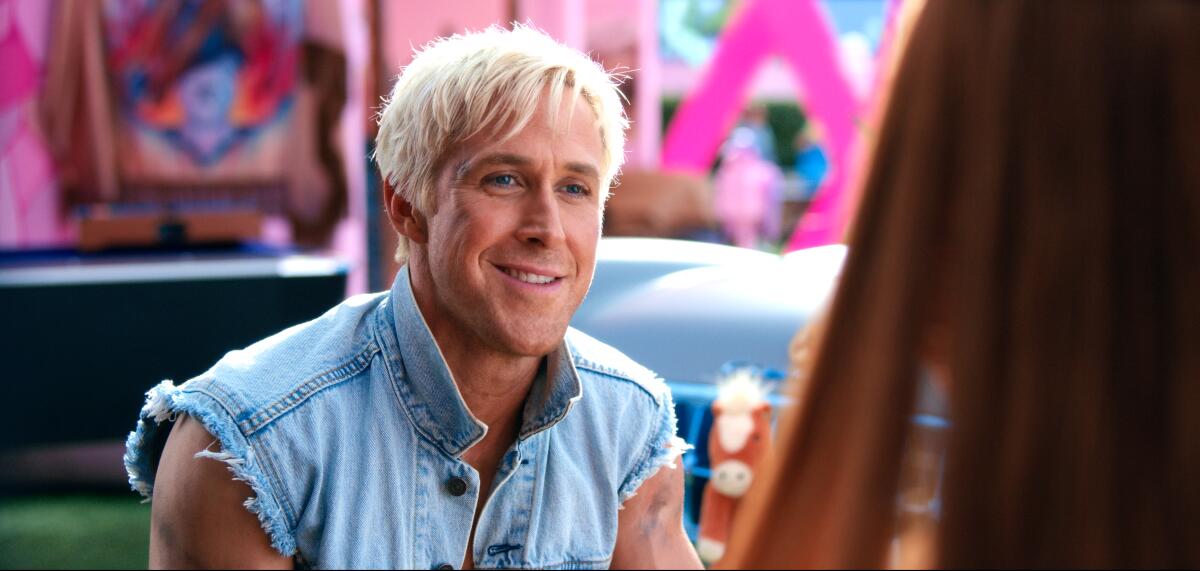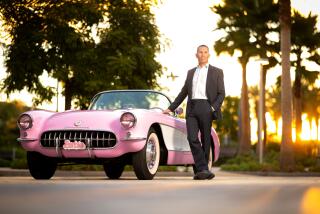Commentary: ‘Barbie’ haters misunderstand what it takes to be Kenough

Warning: Spoilers for the movies “Barbie’” and “Oppenheimer” follow.
As a feminist film, it goes almost without saying that director Greta Gerwig’s summer blockbuster “Barbie” has its haters, largely on the grounds that the movie hates men.
“My main objection is that ‘Barbie’ is not really a film about Barbie at all,” Sarah Vine wrote in the Daily Mail. “It’s one hour and 54 minutes of extended misandry, dressed up with a few fun dance routines and one or two (granted fairly decent) jokes. It’s a deeply anti-man movie, an extension of all that TikTok feminism that paints any form of masculinity — other than the most anodyne — as toxic and predatory, and frames women’s liberation not as a movement based on achieving equality between the sexes but as a cultural revenge vehicle designed to write men out of the story altogether.”
In a Wall Street Journal pan of the movie, critic Kyle Smith wrote that the film’s creators should have questioned “the wisdom of stuffing this fantasy-comedy with references to the mastectomy and IRS troubles of the doll’s creator, gynecology, the mass devastation of indigenous people by smallpox, and (this comes up many times) ‘irrepressible thoughts of death.’” He added: “As bubbly as the film appears, its script is like a grumpier-than-average women’s studies seminar.”
Ben Shapiro’s conservative outlet Daily Wire agrees: “‘Barbie’ Delivers Feminism With A Man-Hating Sledgehammer.” Conservative podcast host Candace Owens has declined to see “Barbie” based on reviews like these. “We are living in a world that is increasingly anti-man,” Owens said. “While we are pretending that women are suffering under the foot of the patriarchy, what’s actually happening is that toxic feminism has risen to the top and is actually oppressing men with movements that make entirely no sense.”
Uncooperatively, “Barbie” grossed an estimated $155 million in the United States and Canada on its opening weekend, with an audience score of 90% on Rotten Tomatoes. No film is for everyone, and just because a movie is popular doesn’t mean it’s a durable or even coherent work of art. You’re safe starting from a position of skepticism that carefully controlled and packaged intellectual property from the highly litigious and image-sensitive Mattel is going to deliver the good things in life, even when top-tier artists such as Gerwig and stars Margot Robbie and Ryan Gosling are given creative freedom to (gently) critique the toy company and one of its flagship-yet-flagging product lines.
But the critics who accurately sized up Gosling’s Ken as the movie’s most reliable punchline aren’t appreciating how generous “Barbie” is toward the opposite sex.
Consider “Oppenheimer,” the male-coded box-office counterpart to “Barbie.” Director Christopher Nolan’s biopic of J. Robert Oppenheimer tells the story of how the physicist helped America win the arms race against Nazi Germany to create the first atomic bomb. Across a three-hour story, Oppenheimer’s emotional arc, in Nolan’s depiction, is relatively short: He loves the science of the bomb right up until the moment he can no longer control it. That’s pretty much it. Women don’t really get much to do, except as sexpots, moms, typists and drunks; in the film’s cumbrous final act, Emily Blunt’s Kitty Oppenheimer is relegated to fuming over who shakes her husband’s hand. In fairness to Nolan’s source material, it’s probably accurate to show American women having more freedom as communist organizers than U.S. Army weapons developers in the 1930s and 1940s.
“Oppenheimer” is a fine film, but “Barbie” is the more cerebral of the two, particularly when it comes to telling the story of a man who realizes his world runs on imperfect interpretations of reality. Gosling’s Ken lives in a pink and plastic country that’s named for somebody else, and his sole desire is to win the attention of a woman who doesn’t love him. Ken’s job is “Beach” in a land with no water; to the extent labor is even real in Barbieland, Ken isn’t allowed to do any. He’s surplus labor in a post-scarcity society, and the only thing for a Ken to do is get in the way of the propertied ruling class. A movie that actually hated men would have left things there.
But in “Barbie,” Gerwig, along with her co-writer Noah Baumbach, give Ken a narrative arc that rivals that of Robbie’s Barbie, whose own journey to self-discovery starts with a growing awareness of mortality. When Ken joins Barbie on a trip to the real world, which isn’t dominated by women, Barbie is disturbed by sexual harassment and the subtext of violence beneath it, while Ken immediately clocks that this is a reality that actually affords him a degree of social recognition, even an unearned kind.
He goes through a patriarchy training montage that takes him to the library stacks, the doctor’s office and centers of business in Century City, kind of like if Che Guevara took a motorcycle tour through a bunch of Andrew Tate videos. He immediately exports the revolution back to Barbieland, where the ruling Barbies seem to melt immediately under the bamboozlement of the Kenaissance and its boys-only minifridges. It’s like if Napoleon were a world-historical himbo, revealing himboism to be the destiny of Europe.
Obviously dictatorships of the broletariat are a bad thing; this is a film about the empowerment and well-being of women, after all. (There’s a name for a totalitarian political faction that controls the railways and the flow of commerce.) The rest of the movie is about the Barbies deploying their political organizing skills and the Kens’ underdeveloped sense of self-awareness to successfully stage a counterrevolution and get their Dreamhouses back.
But didn’t “Barbie” critics find the presence of that song-and-dance stuff with the Kens in the final act a little odd? This movie, which allegedly hates men, sure enjoyed giving them a lot of emotional and dramaturgical real estate in the climactic act, including a Gene Kelly-esque dance number. “I’m just Ken,” Gosling’s Ken croons in the movie’s showstopper number. “Anywhere else I’d be a 10. Is it my destiny to live and die a life of blond fragility?” Anybody with enough self-respect to ask the question is on their way to an answer other than yes.
For all the movie’s ribbing of male oafishness, “Barbie” gives Ken an interior life that goes beyond what classic pink-power predecessors offered their own male characters. 1995’s “Clueless,” starring Alicia Silverstone, and 2001’s “Legally Blonde,” starring Reese Witherspoon, are much more exclusively oriented around women’s journeys of self-discovery and their triumphs over social stereotypes. “Barbie” kicks up trouble by suggesting that women’s journey to self-actualization may include some mileage by men, especially if they also have brains and emotions and ambitions to be more than speed bumps in somebody else’s story.
Self-empowerment only gets so far without some mutual empowerment. Plastic servants make for plastic republics.
More to Read
The biggest entertainment stories
Get our big stories about Hollywood, film, television, music, arts, culture and more right in your inbox as soon as they publish.
You may occasionally receive promotional content from the Los Angeles Times.











